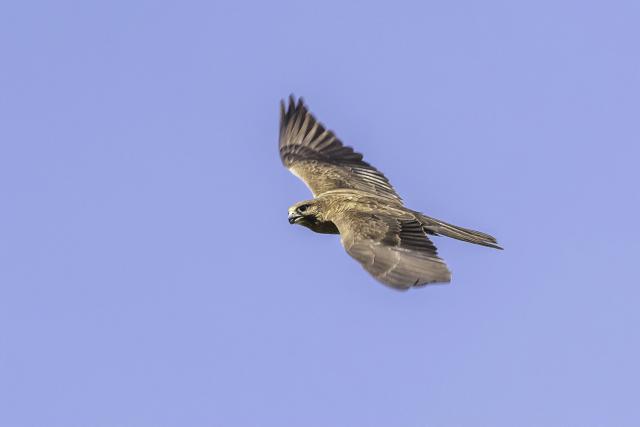
Cade Lucas
The company proposing to build a 700 hectare solar farm in Little River has downsized the project in order to protect a threatened bird species.
British firm Elgin Energy has removed 11 hectares of solar panels from its Barwon Solar project to avoid clearing trees where Black Falcons are known to nest.
Black Falcons are endemic to Australia, but are considered threatened, with numbers in the south-east of the continent thought to have declined by as much as 50 per cent since the early 1980’s.
The plains west of Melbourne are where most Black Falcons in Victoria are still found, with populations observed nesting in trees near Sandy Creek, on the site of the proposed solar farm, since 2016.
After consultation with Department of Energy, Environment and Climate Action (DEECA) and Department of Transport and Planning, Elgin Energy this week announced it had significantly revised the Barwon Solar project in response.
“Elgin removed around 11ha of solar panels to retain 18 trees, including 4 small trees and 14 large mature trees,” said the company in a statement to Star Weekly.
“The retention of trees also created a habitat corridor, providing connectivity to Sandy Creek and the large areas of avoidance around the creek.”
A spokesperson for the Department of Transport and Planning welcomed the outcome.
“It’s vital that we find the right balance between generating more renewable energy, protecting our environment and addressing community concerns around renewable energy projects. That’s why we rigorously assess these projects before approvals are granted.”
Elgin Energy’s announcement was particularly pleasing for Bacchus Marsh zoologist David Whelan who first alerted authorities to the presence of Black Falcons on the Barwon Solar site and campaigned for the trees they nest in to be retained.
“They’ve responded tremendously,” said Mr Whelan of Elgin Energy’s decision.
“It’s really good that they’re willing to alter their plans for a threatened species that they didn’t know was there at the time, that they didn’t know was breeding and was using the site quite frequently.”
Mr Whelan said he hoped the outcome would set a precedent for other large-scale renewable energy developments.
“It’s very important for these large companies who are involved in these big infrastructure projects to listen to the community and particularly when it comes to threatened species.”
While describing Black Falcons as an adaptable bird, Mr Whelan said the trees near Sandy Creek clearly provided an ideal habitat for them and their loss could’ve been devastating.
“Black Falcons are generally very fidelis. They have a high fidelity to a site so if they like a place where they nest, they often go back there year after year.”
The 330 megawatt solar farm proposal is currently being assessed by the Department of Transport and Planning, with an outcome expected by April.






